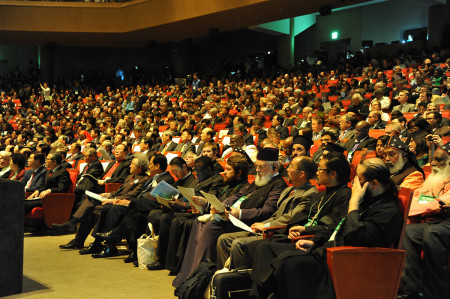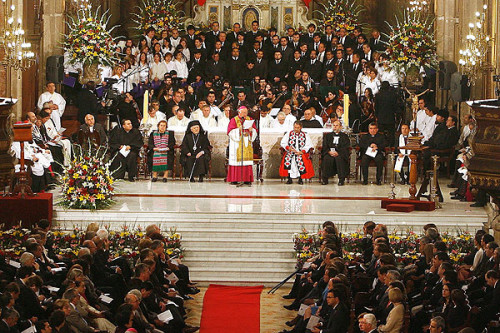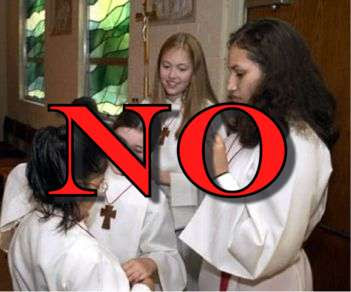
-29-09-2024-
Twenty-Sixth Sunday in Ordinary Time
World Day of Migrants and Refugees
(This World Day was originally established in 1914 as an occasion of prayer and concern for people who had to flee conflict and persecution.
It is especially apt for Ireland in recent times .)
Gospel reading: Mark 9:38-43, 45, 47-48
vs.38 John said to Jesus,
"Master, we saw a man who is not one of us casting out devils in your name; and because he was not one of us we tried to stop him."
vs.39 But Jesus said,
"You must not stop him; no one who works a miracle in my name is likely to speak evil of me.
vs.40 Anyone who is not against us is for us.
vs.41 If anyone gives you a cup of water to drink just because you belong to Christ, then I tell you solemnly, he will most certainly not lose his reward.
vs.42 But anyone who is an obstacle to bring down one of these little ones who have faith, would be better thrown into the sea with a great millstone round his neck.
vs.43 And if your hand should cause you to sin, cut it off; it is better for you to enter into life crippled, than to have two hands and go to hell, into the fire that cannot be put out.
vs.44-45 And if your foot should cause you to sin, cut it off; it is better for you to enter into life lame, than to have two feet and be thrown into hell.
vs.47 And if your eye should cause you to sin, tear it out; it is better for you to enter into the kingdom of God with one eye, than to have two eyes and be thrown into hell.
vs.48 where their worm does not die nor their fire go out."
*******************************************
We have four commentators available from whom you may wish to choose
Michel DeVerteuil :Trinidad Holy Ghost Priest, director of the Centre of Biblical renewal .
Thomas O'Loughlin: Prof. of Historical Theology University of Nottingham NG7 2RD
Sean Goan:Studied scripture in Rome, Jerusalem and Chicago
Donal Neary SJ: Editor of The Sacred Heart Messenger and National Director of The Apostlship of Prayer.
****************************************
Michel DeVerteuil
Lectio Divina with the Sunday Gospels
www.columba.ie
Textual Comments
Today's passage is in two sections:
- a narrative: verses 38 - 40
- a series of five sayings: verses 41 - 48.
 Modern bible scholarship has shown that the different sections of a gospel passage were often written at different times and their juxtaposition may be a matter of chance. But coming to a passage in faith, we take it that divine inspiration brought the sections together, and therefore look for the inner logic linking them, and also linking the individual sayings. This inner logic is then a Word of God for us.
Modern bible scholarship has shown that the different sections of a gospel passage were often written at different times and their juxtaposition may be a matter of chance. But coming to a passage in faith, we take it that divine inspiration brought the sections together, and therefore look for the inner logic linking them, and also linking the individual sayings. This inner logic is then a Word of God for us.
I suggest the following logic in this passage:
1. The basic theme of the passage is expressed in the three sayings in verses 43 to 48. Using different images they all say that in order to "enter into life" we must from time to time make the painful choice to renounce something that is very dear to us.
2. Making this choice sets us free is two ways:
a) from pettiness, illustrated by contrasting attitudes of the disciple John who is not free and Jesus who is (verses 38-40);
b) from ego-centredness, as a result of which we can give ourselves totally to the cause of the "little ones"
- positively: we are deeply touched by those who show them the smallest sign of compassion, e.g. "give a cup of water"; we affirm that "they will most certainly have their reward (verse 41);
- negatively: we are extremely angry against those who put obstacles which bring them down - "they would be better thrown into the sea with a great millstone round their necks (verse 42).
Making the connection in this way reminds us that Jesus never gave abstract teachings. His teachings are always his reflections on his personal spiritual journey. Correspondingly, we who receive those teachings see in them the story of his life.
 Verse 42 is a precious jewel in that it repudiates conclusively the error of contrasting the "vengeful God" of the Old Testament with the "loving God" of the New. This false opposition has bedevilled Catholic spirituality for many centuries and continues to do so today.
Verse 42 is a precious jewel in that it repudiates conclusively the error of contrasting the "vengeful God" of the Old Testament with the "loving God" of the New. This false opposition has bedevilled Catholic spirituality for many centuries and continues to do so today.
Both Testaments reveal the one true God who is passionately committed to the cause of his lowly people. Woe to those who keep them down in any way whatsoever! Far from wanting to "curb his anger" (or asking the Bl.Virgin Mary to do it for us!) we enter into his anger (as Mary did in her Magnificat).
We must be careful therefore not to "interpret" Jesus' words in a way which downplays his passion - what our Catholic tradition has called his "righteous indignation". God's passionate commitment to the poor spells salvation for us all, even those of us who are oppressors - we will be brought low and so be lifted up.
We must identify the "obstacles" referred to by Jesus, starting form our experience. We think of the various things in the world today which prevent the lowly from realizing their full potential e.g
* the lack of material goods,
* of opportunities for education and health,
* of credit facilities;
* the lack of a sense of self-worth,
* of access to sources of grace or spiritual formation.
The "obstacles" can be put by individuals or they can be embedded in the culture (English society recognized recently that it suffers from "institutional racism"). They may be caused by selfishness or by social or economic structures.
Verses 43 - 48 contain dramatic language which we must enter into, getting a feel for the painful choices we must make. We also enter fully into the two possibilities open to us, allowing them to come alive for us - "life" on the one hand, "hell" on the other. Experience (our own or that of people whose lives have touched us) will reveal the meaning of "the fire that does not go out" and "the worm that does not die."
Prayer Reflection
Lord, we thank you for great moments of grace when we decide to renounce something that is precious to us in order to be true to a higher value:
*take a lower paying job in order to have quality time for our family;
* terminate a relationship that is destroying our marriage;
* refuse a post in the workplace which would compromise our integrity;
*accept that our marriage is destroying us and move on;
*lose an election rather than appeal to racism;
*take the risk of confronting authority in the Church.
* join (addiction) group to help us overcome our obsessions
*bear witness when we know an injustice has been perpetrated on someone.
[caption id="attachment_85987" align="alignright" width="273"] Jesus, says when you make your choice don't go for the acts of power and miracles. Don't get caught up by the razzle dazzle.[/caption]
Jesus, says when you make your choice don't go for the acts of power and miracles. Don't get caught up by the razzle dazzle.[/caption]
Before making the decision, it seems impossible,
almost like cutting off a hand or a foot or tearing out an eye;
but once we make the choice, everything flows spontaneously, we just know that it is better to enter into life crippled or lame or with one eye,
rather than continue living in hell, being burnt up by fire that cannot be put out, and eaten by a worm that does not die.
Now we find that we have become free of spirit,
we are no longer worried about whether other people are one of us,
or whether we are personally popular or influential.
As long as the devils of racism, sexism and elitism or class are driven out,
we don't stop those who are doing it, we know that those who are not against what we stand for are for us.
We feel an overwhelming compassion for the little ones of the world, - Jesus' people,
we will do anything to reward those who give them even a cup of water,
and feel anger at those who put obstacles which bring them down.
Lord, we thank you that so often in our time you have sent us someone who was not one of us but who cast out the demons which afflicted our community:
# Gandhi preached the non-violence of Jesus;
#Marxist atheists put us believers to shame in their commitment to the poor;
# warring communities in our own country were brought to the negotiating table by foreigners;
# the World Council of Churches committed itself to ecumenism long before our church joined in;
# the biblical renewal arose among other Christian churches.
Some people tried to stop them, but you brought them to realize that no one who works a miracle in your name is likely to speak evil against you, and that those who are not against you are for you.
Lord, remind us that the poor don't need long speeches or grand gestures; what they want is to experience that they belong to you and therefore are entitled to have a cup of water to drink.
Lord, we pray that your church throughout the world will not be afraid to renounce
* the things that give us security,
*certain customs and rituals that have sprung up over the centuries;
* large numbers;
*beautiful churches;
* prestigious health and educational institutions;
* the patronage of the powerful.
We pray that once we recognize that any of these things is an obstacle bringing down little ones who have faith, we will not be afraid to throw it into the sea with a great millstone around it.
It may be something that is as precious to us as a hand, a foot or an eye, but we must not be afraid to tear it out so that we can enter into the glorious life of being your church,
experience your Kingdom here on earth, rather than living far from your presence,
burning with desires that can never be satisfied or eaten by the worm of jealousy that never dies.
Lord, we think with great compassion of those who are paying the penalty for wrong choices made earlier in their lives;
- parents who were afraid to give up a high lifestyle in order to give time to their children and are now consigned to 'senior citizens' homes with no one to visit them;
- public figures who compromised their integrity in the search for power and were eventually discarded by more powerful authorities;
- those who feel isolated because they neglected their neighbours who were poor.
- those are caught up in their addictions rather than seeking help to escape them .
Deliver them from the hell of loneliness and remorse they now live in rather than let them suffer the fire that never goes out and the worm that never dies.
*************************************
Thomas O'Loughlin
Liturgical Resources for the Year of Matthew
www.columba.ie
Introduction to the Celebration
We gather here as a community, but we are not a club. A club is a group of like-minded people who see themselves or their interests as distinctive from others. We are a community whose deepest desires are pursued by every human being of good will.
*Who are seeking to do what is right;
*who are seeking peace;
*who are bearing witness to the truth;
*who are caring for the creation;
*who are helping the poor and needy
– with all these we make common cause and, gathered here, we commend them to our heavenly Father.
We desire to accept Jesus' inclusive vision that all who are not against us are for us, but know that often we too fall short of this calling and recognise our need of forgiveness and healing.
[caption id="attachment_85990" align="aligncenter" width="301"] The Christian Church is ecumenical in nature [/caption]
The Christian Church is ecumenical in nature [/caption]
Gospel
Today's lection is made up of two distinct pieces of Mark's story:
first, the incident of 'the stranger' exorcist (vv 38-41);
and second, teaching on temptations (vv 42-8). The 'link' in Mark's eyes presumably being the reference to 'his reward' in v 40 acting as an introduction to various ways by which one could lose one's reward. However, neither Matthew nor Luke understood Mark's linking of the two passages as each responded to the two sections differently from Mark (and one another).
 The first section is by far the most interesting as it gives an insight into 'open' attitude of Jesus to the whole work of inaugurating the kingdom (a kingdom that for Jesus is characterised by healing, forgiveness, and restoration, rather than the advent of judgement and retribution).
The first section is by far the most interesting as it gives an insight into 'open' attitude of Jesus to the whole work of inaugurating the kingdom (a kingdom that for Jesus is characterised by healing, forgiveness, and restoration, rather than the advent of judgement and retribution).
This is the very opposite of a sectarian view: you do not have to join the right huddle in order to be part of the coming kingdom of God. This openness is the antithesis of most of the preaching of the time: the people in Qumran believed one had to go off and live in a separate settlement; John the Baptist preached the need to become associated with the special group that was distinguishing itself from the sinful mass of the people by a baptism of repentance; the zealots were preaching a political sectarianism, the Pharisees a distinctiveness of precise adherence to the law. Now Jesus tells people that the Father's love knows no bounds and extends to everyone who seeks him and, therefore, this stranger is as much a member of the kingdom as the visible group. This openness was too much for the more sectarian minded in the early church: Matthew simply ignores the incident and then, at a suitable point, has Jesus preach the opposite position (Mt 12:30).
The second section is a single piece of teaching expressed through a fourfold repetition of a warning: any amount of physical suffering is better than sin or causing others to sin. It is with these highly visual warnings that Mark rounds off his teaching on discipleship. The examples show how the early church took over the imagery of a place of continual torment, Gehenna (rendered in our translations as 'hell'), awaiting those who accept a sinful way of life. The most gruesome image is that of 'where their worm does not die, and the fire is not quenched' which is a quotation from the final verse of the Book of Isaiah (66:24). In Isaiah, this was read as the final destiny of those who had rejected the reign of God; now the image is invoked as the alternative to discipleship. Placed immediately after the statement about people being rewarded for the smallest acts of mercy (v 40), the combined text has a very particular flavour. On the one hand, the least acts of mercy can bring one into the kingdom of God, but, by contrast, to deliberately lead 'little ones' — this refers to the poor and the marginalised, and not simply children — astray leads to death.
Homily Notes
[caption id="attachment_85992" align="alignleft" width="259"] All means inclusive![/caption]
All means inclusive![/caption]
1. 'Inclusiveness' is a modern virtue! We are told of the importance of 'inclusive language,' sales people and politicians stress that all references to people must be 'inclusive': we are this, we are that, and we are moving forward. As soon as any person or group is not 'in the loop' or consulted or mentioned, then there is trouble. Every decision must be inclusive because if someone or group is excluded, then there will be trouble.
In this simple world nice people are inclusive and nasty people are exclusive. But this desire to be inclusive is often only a facade, a marketing ploy, or formulaic adherence to political correctness.
2. 'Exclusiveness' seems also to be virtue! A chic, expensive restaurant where people want to be seen is an 'exclusive restaurant' — 'exclusive' is an adjective of quality and approval. 'An exclusive holiday destination' is where only a few, 'of the better people' — just like us, go. In an exclusive resort there will be 'no riff-raff!' An 'exclusive offer' for this or that comes with every postal delivery: it means we, just a few of us, are special.
Unlike the great-unwashed mass of humanity, we appreciate such an exclusive opportunity and, indeed, being the special sort of people we are, we deserve this exclusive offer. (Exclusiveness is even a desirable quality in tinned fish: 'It is the fish John West rejects that make John West salmon the best!')
3. Exclusion as a tool within society is deeply programmed into us. The tribe is defined by the people who-do-not-belong. Then they become 'the others' and because they are not 'with us,' they are opposite us, and so they can easily be seen as opposed to us, and a threat. The others must be kept in place, they must be controlled, excluded from power, made subject to us and, if necessary, be destroyed. Exclusiveness is ideal as a means of making us united, but then can often destroy us in the conflicts and wars that it makes possible. How many leaders down the centuries who, when they found themselves without any positive vision with which to lead a people, turned to exclusiveness and preached the fear of others, and held sway by the threat of the others.
[caption id="attachment_86023" align="alignright" width="313"] 'Altargirls wanted here!'[/caption]
'Altargirls wanted here!'[/caption]
4. We can see this demonising of 'the others,' the pernicious attitude that only 'we' are OK / saved / normal, in the way countries are run (e.g. apartheid), in the way churches are run (e.g. sectarianism), or how some club or association is run (there must be careful 'screening' of who joins the residents' association lest the area's value be undermined). We see it at work in today's gospel: someone was doing the same things as the disciples, but because the person was not inside the group, then he was a threat; therefore he was to be stopped.
5. The reply of Jesus clearly shocked them: he who is not against us is for us. This is the very opposite of exclusiveness, this is true inclusiveness — not simply a facade to make an impression. This is the inclusiveness that is based in the infinity of God's goodness and love, and it is that openness and generosity that we are called to imitate.
 6. Sadly, it was just too shocking for the disciples, and the record of the churches ever since has not been very honourable. It shocked the first followers because it was reversed in Matthew (12:30) to become: 'He who is not with me is against me!' Matthew wanted a neat little world where people 'knew where they stood' and if they were not with Jesus, then they must be against him. Matthew's clarity is all too human; Mark's statement could only come from someone who fully embraced the world with love. And, the church has been closer to Matthew than to Mark: we are very good at noting who does not belong, who should be excluded from communion, who is to be seen as a threat. Equally, we have been very good at dividing up the Body of Christ into exclusivist sections: clergy — lay; those with 'authority' and those who are supposed to be led. An inclusive love that sees each Christian, indeed each human, as someone called by God to participate in the growth of the kingdom seems utopian. Yet, it is just such a communion of love that we, as the church, are to model to faction-riven humanity.
6. Sadly, it was just too shocking for the disciples, and the record of the churches ever since has not been very honourable. It shocked the first followers because it was reversed in Matthew (12:30) to become: 'He who is not with me is against me!' Matthew wanted a neat little world where people 'knew where they stood' and if they were not with Jesus, then they must be against him. Matthew's clarity is all too human; Mark's statement could only come from someone who fully embraced the world with love. And, the church has been closer to Matthew than to Mark: we are very good at noting who does not belong, who should be excluded from communion, who is to be seen as a threat. Equally, we have been very good at dividing up the Body of Christ into exclusivist sections: clergy — lay; those with 'authority' and those who are supposed to be led. An inclusive love that sees each Christian, indeed each human, as someone called by God to participate in the growth of the kingdom seems utopian. Yet, it is just such a communion of love that we, as the church, are to model to faction-riven humanity.
7. Today's gospel calls all of us to examine our behaviour. Does it reflect inclusive love: anyone who is not against us is with us; or, is it that all too human exclusivist vision: anyone who is not with us is against us?
8. In that shift in perspective lies the difference between religious observance as an aspect of human life and true discipleship of Jesus.
**********************************
Sean Goan
Let the reader understand
www.columba.ie
Gospel
At first glance this collection of sayings do not appear to have a lot in common but in fact everything here is a challenge to those who claim to follow Christ to pay attention to their attitudes and motivation. This is because they have been given an awesome responsibility and they must not presume they are somehow superior to others. J esus first corrects John for stopping someone doing the work of the kingdom because he is 'not one of us.' There is no place for elitism among his followers and indeed anyone who shows them a simple kindness will be blessed. This means that there is an onus on the disciples to reflect the work and attitudes of their master. Just as he reached out to the sinners and outcasts so must they – failure to do so will result in harsh judgement because they will be undermining the very project they are called to serve. This is why they must avoid anything that would lead them to sin. The true disciple will be the one who knows how to rejoice in the good that is done by whatever source and who also knows that his or her own behaviour can make it hard for others to come to faith. The lesson here is to examine ourselves and to judge no-one else!
esus first corrects John for stopping someone doing the work of the kingdom because he is 'not one of us.' There is no place for elitism among his followers and indeed anyone who shows them a simple kindness will be blessed. This means that there is an onus on the disciples to reflect the work and attitudes of their master. Just as he reached out to the sinners and outcasts so must they – failure to do so will result in harsh judgement because they will be undermining the very project they are called to serve. This is why they must avoid anything that would lead them to sin. The true disciple will be the one who knows how to rejoice in the good that is done by whatever source and who also knows that his or her own behaviour can make it hard for others to come to faith. The lesson here is to examine ourselves and to judge no-one else!
Reflection
Two aspects of what might be called worldly thinking are challenged in the first and second readings. It is often the case that people with power and authority will guard it jealously and exercise it in a way which promotes th eir status more than it actually serves others. It is this behaviour which is shown to be at odds with what God wants in the Book of Numbers. Joshua has to learn that leadership is about service and Moses as a true leader has the humility to teach him. So too in the Letter of James the worldly view that wealth brings freedom to live our lives exactly as we would like is knocked on the head. We are only travellers and we should always live with an eye to our final destination.
eir status more than it actually serves others. It is this behaviour which is shown to be at odds with what God wants in the Book of Numbers. Joshua has to learn that leadership is about service and Moses as a true leader has the humility to teach him. So too in the Letter of James the worldly view that wealth brings freedom to live our lives exactly as we would like is knocked on the head. We are only travellers and we should always live with an eye to our final destination.
********************************************
Donal Neary SJ
Gospel Reflections for Sundays of Year B
www.messenger.ie/bookshop.
Making a Difference
There’s’ a certain definiteness in the gospel today. Like a team going on a field to win. We are either with Jesus or against him, and this is proved in our way of life. Following Jesus does not necessarily mean being different from others. It means throwing ourselves into the everyday life and needs of people and giving what we can.
It comes out also in public life. We can make our voices heard about issues which deeply effect others, like respecting and protecting life, like ensuring we care for our children in fact as well as in law, legislating wisely about marriage, in how we legislate for the care of our elderly. We may work to free our country from the effects of addiction with drugs and alcohol.
Jesus is asking for a definite way of life and of wanting to make a difference. Faith is more than assent of the mind, but a way of life and of trust – a way of life in not hindering others, but helping with compassion and good deeds. Our way of life is a sharing of faith one to another – “Faith is passed on by contact, from one person to another, just as one candle is lighted from another” – Pope Francis.
The people who make a difference are building blocks rather than stumbling blocks. Every good cause will have its 'begrudgers'. The apostles themselves were like that and bit by bit realised that following Jesus can be seen in many ways, and in the giving of cold water or hot soup, or in any way, making a big difference in life is being a true follower.
Remember a time you made a difference in someone’s life.
Ask the Lord that we be able to do this again.
Lord, teach me to serve you as you deserve.
*******************************************